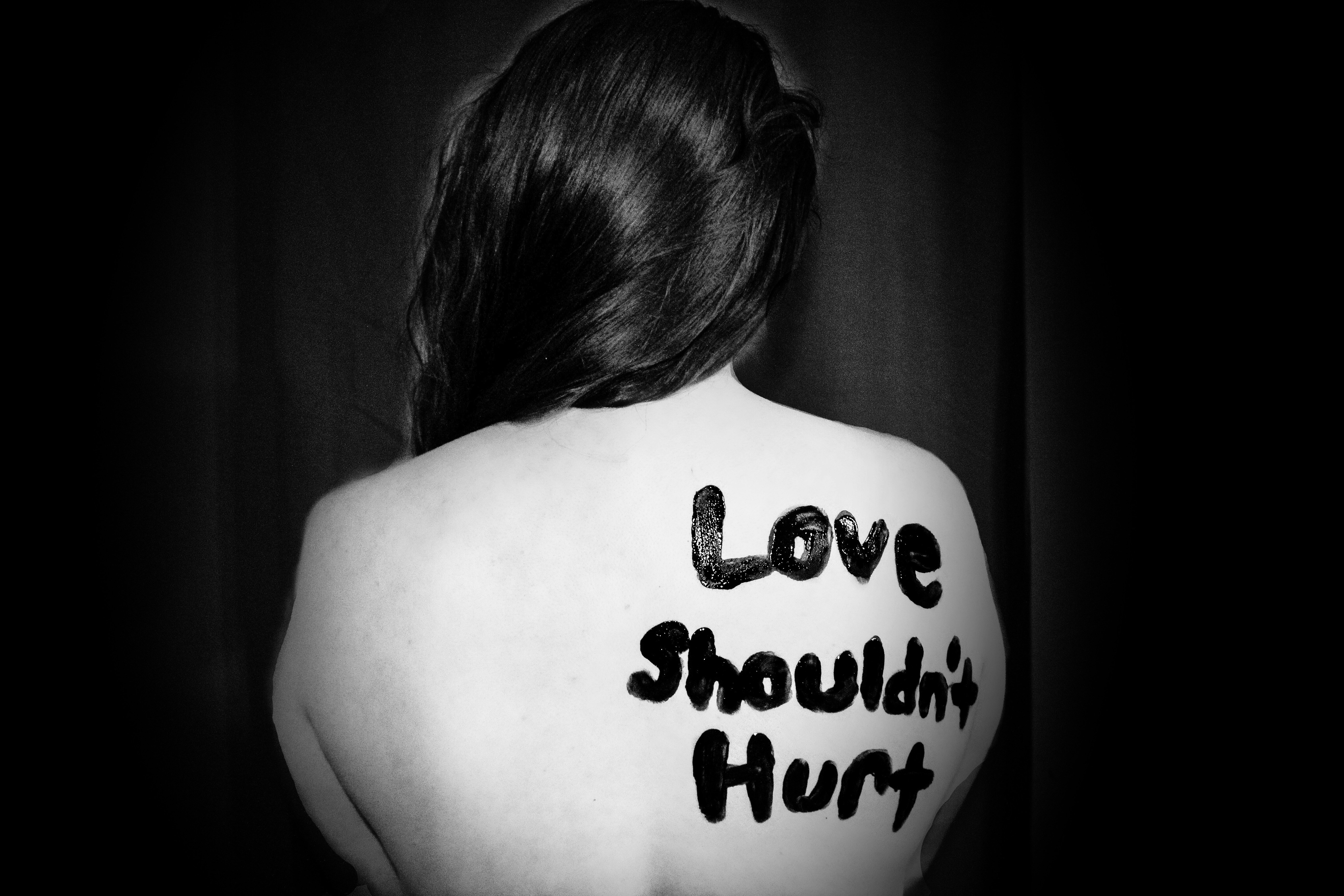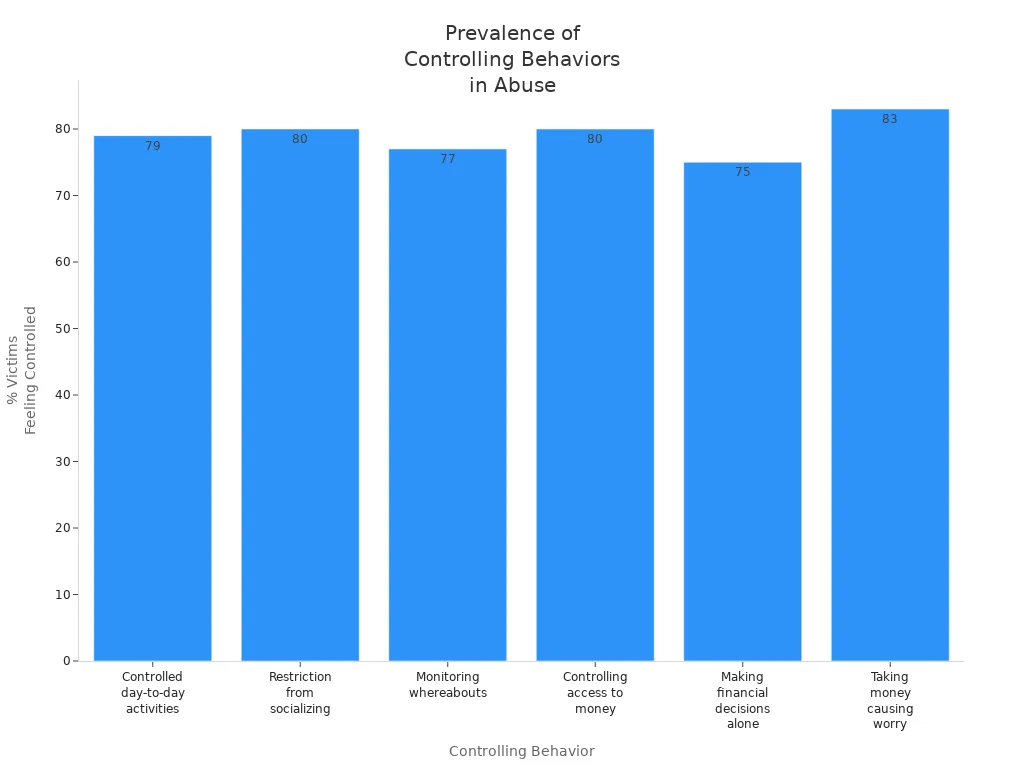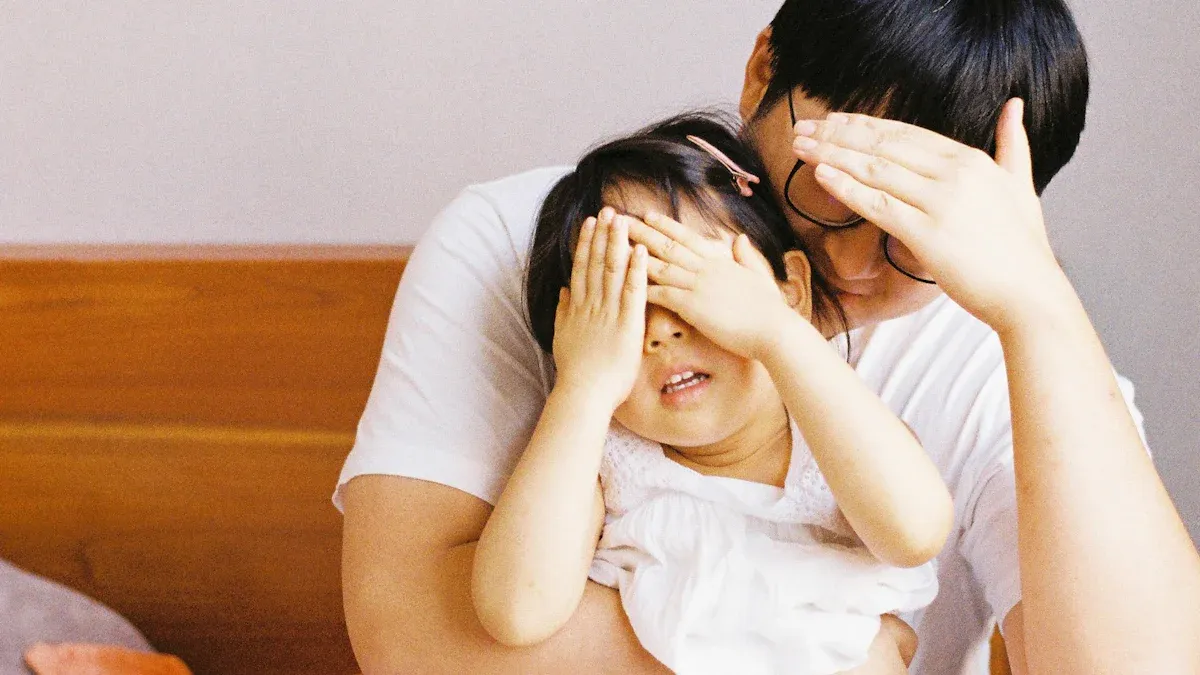Recognizing Signs of Domestic Violence Early

You might see changes in how someone acts or talks. They may also act differently with others. Even a few warning signs of domestic violence can mean danger. Trust your gut if you feel unsafe or worried. Noticing these signs early can save lives. Studies show that finding signs of domestic violence early can stop serious harm. It can also help victims get help faster.
Knowing these facts helps you stay aware. You can help people who need support. Seeing the signs of domestic violence early is important for safety.
Key Takeaways
Watch for early signs like jealousy, control, insults, and threats. These signs can help you protect yourself or others.
Domestic abuse is not just hitting. It can be emotional, financial, or online control too.
Abuse hurts children and families for a long time. Getting help early can keep everyone safe.
Some feelings or beliefs can hide abuse. But learning the facts helps you see abuse clearly.
Make a safety plan and keep your online life private. Talk to people you trust or call hotlines for help.
Warning Signs to Help You Recognize Domestic Violence Early

Signs of Domestic Abuse
You might see certain behaviors that show domestic abuse. These signs can happen before any physical violence starts. Many people think only physical harm is abuse. But emotional and controlling actions are also serious. You should watch for these early signs of domestic violence. They can help you protect yourself or someone you care about.
Some common signs of domestic violence are:
Extreme jealousy and possessiveness when you spend time with friends or family
Your partner tries to stop you from seeing others
Insults, shaming, or mean comments, especially in public
Not letting you make choices about work or school
Controlling all the money without talking to you
Pressuring you into sexual acts or using drugs and alcohol
Using intimidation with scary looks or actions to frighten you
Threats against your children, pets, or loved ones
Breaking your things or damaging your home
Tip: Emotional abuse and subtle control can hurt as much as physical violence. Trust your feelings if something feels wrong.
Healthcare workers look for these signs of domestic abuse. They notice if someone has injuries that do not match their story. They also see if a person seems scared to talk. Doctors and nurses ask special questions to find out if someone is in an abusive relationship. They know both men and women can be victims.
Recognizing Early Red Flags
Seeing early red flags can help you stop domestic violence before it gets worse. Many victims say they feel controlled by their partner’s actions, even at the start. These actions can include controlling money, limiting who you see, and watching your phone or location.
Here is a chart showing how often victims feel controlled by different behaviors:

You might see other early warning signs of domestic violence, like:
Being kept away from friends and family, leading to social withdrawal
Injuries you cannot explain or missing school or work a lot
Feeling scared around your partner
Not being allowed to use money or being dependent on your partner
Changes in appearance like wearing long sleeves in hot weather to hide bruises
Worrying a lot about your partner’s reactions
These warning signs of domestic violence can start small but get worse over time. You may see your partner making choices for you, saying mean things about how you look, or blaming you for problems. Some abusers use threats or scare you to keep you quiet. Others may break your things or threaten to hurt people or pets you love.
Note: Seeing early red flags and signs of an abusive relationship can save lives. Getting help early can stop abuse from getting worse. Research shows that when people get help early, the risk of harm goes down.
Different Types of Abuse and How to Identify Them Early
Domestic abuse is not just about hurting someone physically. It is when someone tries to control another person. There are different types of domestic abuse. Each type can start with small warning signs. If you learn to see these signs early, you can help yourself and others.
Physical and Emotional Abuse
Physical signs of domestic violence are the easiest to see. You might notice bruises, cuts, or broken bones. Sometimes, people hide these signs. They may wear long sleeves even when it is hot. Emotional abuse is harder to spot. It can hurt just as much as physical abuse. It often starts with verbal abuse like mean words or insults. Your partner might call you names or make you feel bad. They may throw things or threaten to break your stuff. Words can hurt your feelings a lot. Over time, emotional abuse can make you feel alone. You may start to doubt yourself. Many times, emotional abuse happens before physical abuse. Both types try to make you feel weak and powerless.
Financial and Digital Abuse
Financial abuse is when someone controls your money. Early signs include not letting you have your own bank account. They may watch every dollar you spend. Your partner might take your paycheck or make you ask for money. Sometimes, they open credit cards in your name without asking. Digital abuse is when someone uses technology to control you. They might read your texts or check your social media. They could use apps to see where you are. These types of abuse can make you feel stuck and unable to leave.
Gaslighting and Control
Gaslighting is when your partner makes you question your memory or feelings. They might say things did not happen. They may blame you for problems or say you are too sensitive. After a while, you may doubt your own mind. This is a strong way to control someone. You might feel confused or anxious. You may even feel like you are "going crazy." Gaslighting often starts with small lies. It gets worse over time. The goal is to keep you under control and make you depend on them.
Important Resource: If you're experiencing confusion about whether certain interactions involve gaslighting or manipulation, Gaslighting Check can help you identify these patterns. This tool is especially valuable when you're questioning your own perceptions or need clarity about confusing situations in your relationship.
Remember: Domestic abuse involves coercive controlling behaviours that are always about power and control. If you see these behaviors, trust your gut and get help.
Domestic Violence's Impact on Children and Family

Signs in Children
Children who live with domestic abuse often change a lot. They may feel scared, worried, or show signs of distress all the time, have trouble sleeping, get angry, or become very quiet. You might see problems at school or changes in eating habits. These signs show that domestic abuse really hurts children. If you see these changes, parents and kids should get help right away.
Family Dynamics
Domestic abuse changes how families work together. There may be more stress and fighting at home. Family members may stop trusting each other. Kids who see or feel abuse often do not feel safe at home. Crowded homes and bad living conditions can make things worse. Money problems and strict gender roles can keep abuse going. The COVID-19 pandemic made things even harder for many families. If someone at home has mental health or drug problems, abuse is more likely. Education, especially for women, can help lower the risk. Support for parents can help their families become safer and healthier.
If you see more fights, sadness, or fear at home, ask for help for parents. Getting support can keep your family safe from domestic abuse.
Long-Term Effects
The effects of domestic abuse can hurt people for a long time. Kids and adults may feel anxious, sad, or have post-traumatic stress disorder. Some people get sick a lot or have pain that does not go away. Abuse can break up families, causing separation or divorce. Many families have money problems because of job loss or control by the abuser. Kids may have trouble in school or making friends. Trust issues can make it hard to have good relationships later. Feeling alone or ashamed can stop people from asking for help. The effects of abuse can pass down to the next generation.
Common Barriers That Prevent People From Recognizing Abuse
Emotional Barriers
It can be hard to see domestic abuse because of strong feelings. Many people feel alone and rely on their abuser for help. You might think the abuse is your fault or feel mixed up. Sometimes, you may not trust your own memory or feelings. Abusers use tricks like making you feel embarrassed or playing with your emotions. They may also make you feel like you are losing your mind. These things can cause worry, sadness, and make you doubt yourself. You might feel guilty or ashamed, which makes it harder to notice the abuse.
Emotional barriers that make it hard to see domestic abuse:
Feeling lonely or cut off from people
Thinking you caused the abuse
Being scared others will judge or not believe you
Feeling worried, sad, or having trouble remembering
Beliefs from your religion or culture that tell you to stay quiet
If you feel stuck or confused, know these feelings are normal in domestic abuse.
Social and Cultural Factors
What people around you believe can change how you see domestic abuse. In some places, people think abuse is normal or should be kept secret. You might feel you have to protect your family’s name or worry about shame if you talk. Some cultures say men should be in charge, so abuse seems okay. You may also be scared to lose your home or money if you tell someone. Many people do not trust the police or help groups, especially if they had bad times before.
Social and cultural factors that hide domestic abuse:
People in your area think violence is normal
Fear of shame, gossip, or losing respect
Strong ideas about men and women that excuse abuse
No help from family or friends
Many people who go through domestic abuse stay quiet because of these reasons.
Myths and Misconceptions
There are many wrong ideas about domestic abuse that make it hard to spot. Some people think abuse only means hitting, but it can also be emotional, money, or online abuse. You may think only certain people get abused, but it can happen to anyone. Some believe victims can just leave, but leaving is often scary and hard. Others think abuse only happens in straight couples, but it can happen to anyone. Some people think abuse is just one time, but it usually happens again and again.
Common myths about domestic abuse:
Only hitting or hurting counts as abuse
It only happens to women or certain people
Victims can just leave easily
Abuse is just a family problem
Kids are not hurt by abuse
Knowing the real facts about domestic abuse helps you see it and get help faster.
Comprehensive Domestic Violence Support Resources
Safety Planning
You can develop protective behavior and do things to help keep yourself safe from domestic abuse. A safety plan helps you get ready for emergencies and protect yourself. Here are some key parts of a safety plan:
Watch for warning signs and notice changes in your partner’s actions.
Build a group of people you trust. Tell friends, family, or adults at school about what is happening.
Plan a safe place to go if you need to leave fast. Keep a bag with clothes, money, keys, and important papers ready.
Learn and remember phone numbers for help.
Make your home safer by picking safe rooms, planning ways out, and moving dangerous things away.
Talk to your kids about what to do if there is an emergency. Teach them how to call for help and where to go.
Share your plan with people at work or school who can help you.
Take care of your feelings and mental health. Check your plan often and change it if you need to.
Tip: Look at your safety plan often. Your needs might change as time goes on.
Digital Security
Keeping your online life private is very important. Abusers might try to find out where you are or read your messages. You can use these steps to stay safer online:
Use computers in public places like libraries for private searches.
Make new email accounts on safe devices your abuser cannot use.
Change your social media privacy settings and remove location tags.
Use safe phone numbers, like a prepaid phone or Google Voice.
Clear your browser history and check if someone is watching your devices.
Note: Always think your devices could be watched. Stay careful and update your security often.
Getting Help
You do not have to deal with domestic violence by yourself. There are many places that can help you stay safe and give support. Here are some places you can contact right away:
Domestic violence helpline - National Domestic Violence Hotline: 1-800-799-SAFE (7233) or text START to 88788
Online chat with helpers in over 200 languages
Local shelters and safe houses for a place to stay
Legal help for protection orders and court support
Trauma-informed care, counseling and support groups for you and your kids
Special hotlines:
StrongHearts Helpline (Native Americans): 844-762-8483
National Teen Dating Abuse Helpline: 866-331-9474
The Deaf Hotline (video phone): 855-812-1001
These services are free, private, and stay updated on current health topics related to domestic violence. Domestic violence support programs help you feel safer, give you hope, and connect you to caring people. Many survivors say that support groups, counseling, and safe places to live help them feel better and heal.
Remember: Asking for help shows you are strong. You deserve to be safe and treated with respect.
You are important in helping stop domestic violence early. If you see warning signs and pay attention, you can help stop harm. This is very important for kids. Acting early, like listening and being kind, can help end abuse. It can also help people heal. Nobody should be abused. There is help for everyone. Your words can help make your community safer. Speak out and ask others to help too.
FAQ
What should you do if you notice early signs of domestic violence?
If you see early signs, trust your feelings. Get help as soon as you can. Talk to someone you trust or call a hotline. Acting fast can keep you safe and stop harm.
Can domestic violence affect your health?
Yes, domestic violence can hurt your body and mind. You might feel pain, worry, or stress. Managing health with help from health experts can help you heal and stay healthy.
How can you support a friend who may be experiencing abuse?
Listen to your friend and do not judge them. Give them support and share helpful resources. Tell them about safety plans and health tips. Remind them they are not alone.
Is it possible for abuse to happen without physical violence?
Yes, abuse is not always about hitting. It can be emotional, financial, or digital. You may not see bruises, but mean words and control are still abuse. Always take these signs seriously.